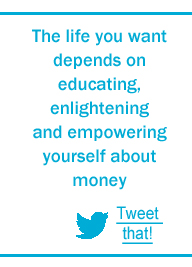By Sheila Walkington, co-founder and CFO Money Coaches Canada and the Women’s Financial Learning Centre
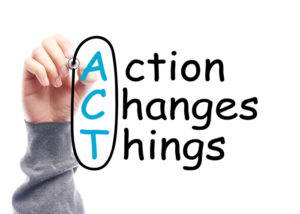
Most people procrastinate from time to time, it’s human nature to put off tasks we believe to be unpleasant or time consuming. But the habitual putting off of our responsibilities, especially our financial responsibilities, transforms procrastination into avoidance. Avoidance —Stage 2 of the 7 Stages of Financial Well-BeingTM —is one of the most potentially damaging stages on the path to financial fulfillment.
Are you in Avoidance?
It’s essential to understand that financial well-being comes with a deeper understanding of where you stand with money, emotionally and financially, developing concise and attainable goals, getting organized and implementing a manageable plan to move forward. The 7 Stages of Financial Well-BeingTM is a framework that will help you better understand where you are, and what actions to take, as you move towards Financial Fulfillment.
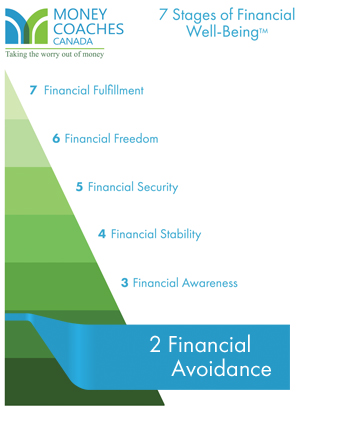 Each stage on the pyramid is associated with a different set of emotional, behavioral and financial characteristics. You have slipped into Avoidance if you can identify with several of these points:
Each stage on the pyramid is associated with a different set of emotional, behavioral and financial characteristics. You have slipped into Avoidance if you can identify with several of these points:
- Emotions: overwhelm, confusion, insecurity, frustration
- Behaviors: paralysis, not sure where to turn, head in the sand
- Financial status: random savings, no advisor, disorganized finances, accounts at various banks, little financial control/knowledge
One of the best ways to recognize your situation, and move forward, is to learn from the experiences of others. We’d like you to meet Matt and Sandra.
Matt and Sandra’s story*
Matt and Sandra were doing exceptionally well financially, with earnings and dividends amounting to almost half a million dollars a year. They made the decision that Sandra would put her professional career on hold for a few years to stay home with their three young children, one of whom had some health issues.
Even though the decision was made together, the lack of a shared financial vision for their new situation soon took its toll. After years of her own income, Sandra resented having to “ask” Matt for money for the running of the home or for things she wanted or needed to buy. And Matt began to feel as if he was nothing more than an open wallet. Instead of feeling like a team they felt isolated. They both sensed that their money was moving in and out of their accounts faster than they could keep track, but as long as it was flowing they avoided dealing with their resentments or their fears. But as they started to accumulate credit card and line of credit debt they knew they couldn’t remain in this financial fog any longer and they reached out to Money Coach Melanie Buffel.
They wanted to know why, with all the income they had, they couldn’t seem get ahead or feel secure about their future. The answer was that they were stuck in avoidance. They were using their money, but they weren’t managing their money. There was no vision for the future or plan for today.
How to deal with Avoidance
The first step is to clear the fog through an honest look at your entire financial situation. It can be very beneficial to have a clear-eyed, non-judgemental ally, like a Money Coach, by your side as you take this journey. Here are five things to keep in mind:
Avoidance affects people of all income levels. It has far more to do with your emotional relationship to money than your earning power.
2. Don’t beat yourself up about the past
Getting caught up in regret is just another way to avoid moving forward. Forgive yourself for your past inaction then congratulate yourself on facing reality and making a commitment to change.
3. Take a step back
Create a vision for your money that goes beyond immediate needs and wants. Step back to see the broader picture of your life. What goals —short and long term—do you want your money to support? What are your retirement needs?
4. Create a plan
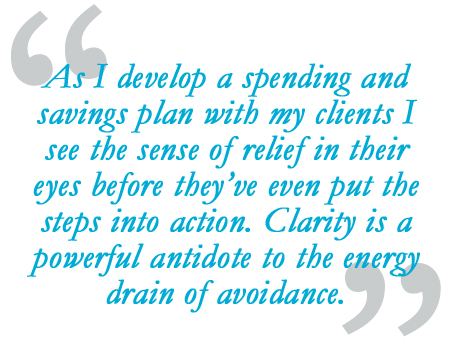 Avoidance thrives in confusion and overwhelm. Money Coach Melanie Buffel says, “As I develop a spending and savings plan with my clients I see the sense of relief in their eyes before they’ve even put the steps into action. Clarity is a powerful antidote to the energy drain of avoidance.”
Avoidance thrives in confusion and overwhelm. Money Coach Melanie Buffel says, “As I develop a spending and savings plan with my clients I see the sense of relief in their eyes before they’ve even put the steps into action. Clarity is a powerful antidote to the energy drain of avoidance.”
5. Schedule engagement
Research has shown that the best way to break a habit is to replace it with a better one. The best way to counter avoidance is engagement. Melanie suggests that her clients have weekly money meetings, at least until they create some traction in their new habits. Once new habits are formed, Melanie suggests clients maintain bi-weekly or monthly check-ins in order to maintain momentum and stay on track.
Communication was crucial to creating change for Sandra and Matt. They worked through the resentment that was building in silence, and began relating as a couple with a shared vision for their family.
Accountability can be key to someone overcoming avoidance habits. Melanie suggests that single people have their money meetings with a trusted accountability partner from their family or circle of close friends. It’s also a role that can be filled by a Money Coach.
Tools and Resources
At Money Coaches Canada and the Women’s Financial Learning Centre, we have several resources to help you get inspired and motivated to overcome financial inertia. When someone has fallen into avoidance patterns they can come to believe that they are “just not good with money.” But thoughts like that just become a self-fulfilling prophecy that allows people to give away their financial power.
Let go of limiting thoughts and build your money confidence with these resources:
- Dreams Worksheet Free Download
- Your Life and Financial Goals Worksheet Free Download
- Your Money Map: How to Plan and Organize Your Money to Create Your Ideal Life by Money Coaches Canada and the Women’s Financial Learning Centre co-founders Karin Mizgala and Sheila Walkington Purchase the book
Acknowledge and Appreciate
It’s essential at all of the 7 Stages of Financial Well-BeingTM to acknowledge your efforts and appreciate what you have accomplished along the way. No matter what your new awareness has brought to light be grateful for what you have. Be patient and recognize all your wins, no matter how small they may seem right now. You are building a stronger foundation for your future and taking responsibility for your financial choices. Be proud of yourself.
Next Steps
The life you want depends on educating, enlightening and empowering yourself about money. It takes being open to a mindset shift, a commitment to having a different relationship with money and courage to face some of the demons you may have been trying to avoid.
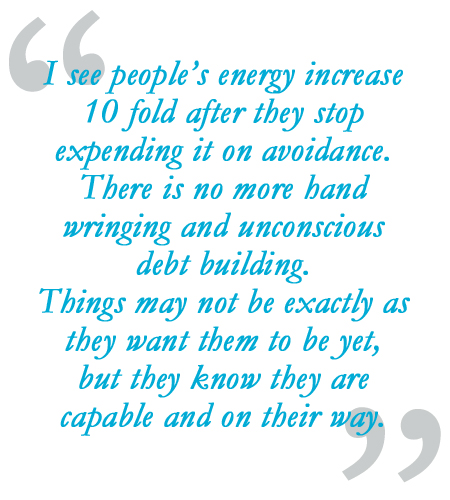 The encouraging news is that the move to Stage 3 —Awareness is fuelled by energy that was blocked or drained while you were in avoidance. Melanie enjoys witnessing the incredible change in her clients, “I see people’s energy increase 10 fold after they stop expending it on avoidance. It’s not uncommon for someone who was leaving bills unopened for months, to suddenly be excited to track every expense. There is no more hand wringing and unconscious debt building. Things may not be exactly as they want them to be yet, but they know they are capable and on their way.”
The encouraging news is that the move to Stage 3 —Awareness is fuelled by energy that was blocked or drained while you were in avoidance. Melanie enjoys witnessing the incredible change in her clients, “I see people’s energy increase 10 fold after they stop expending it on avoidance. It’s not uncommon for someone who was leaving bills unopened for months, to suddenly be excited to track every expense. There is no more hand wringing and unconscious debt building. Things may not be exactly as they want them to be yet, but they know they are capable and on their way.”
If you are in Avoidance, I challenge you to do one financial task today that you have been avoiding. Odds are good that even if it’s unpleasant, you’ll have a sense of relief at having done it. Start building some forward momentum and you’ll discover the energy and power that comes with Awareness.
You don’t have to do it alone, contact a Money Coach today.
*Names and identifying details have been changed for privacy. Story used with permission.

